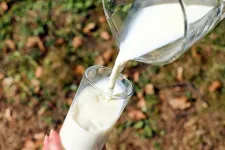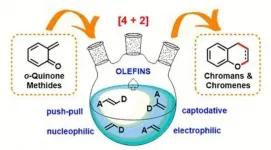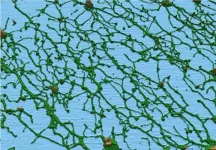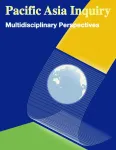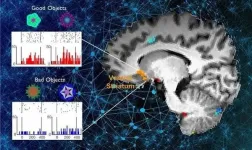(Press-News.org) As G7 governments renew commitments to protecting marine spaces and biodiversity, global conservation initiatives such as 30x30 are feared to pay too little attention to the livelihood impacts on communities
Close-up inspection of an upcoming marine conservation area in Cambodia shows mixed livelihood consequences ranging from improving relationships to the state to increased anxiety and social division
In the long term and on a regional scale in Southeast Asia, communities exposed to marine conservation are poorer and experience higher child mortality
Researchers warn that the rapid global expansion of nominal marine protected area (MPA) coverage can undermine community livelihoods if it proceeds with a sole focus on marine resource conservation, a disregard of local social contexts, and a lack of livelihood adaptation support for affected communities.
Researchers urge that marine conservation interventions should follow social impact assessments and go hand-in-hand with livelihood support schemes for affected communities
Governments and international organisations are expanding targets to conserve marine spaces to stem the worrying depletion of biodiversity and fish stocks around the globe. A new study now demonstrates the wide range of unintended impacts that such conservation efforts have on affected communities.
Published today in the leading international development journal World Development, the research presents a ground-breaking case study of the Cambodian Koh Sdach Archipelago combined with a cross-country statistical analysis of the impacts of marine conservation across Southeast Asian communities:
The detailed and up-close analysis demonstrates a mix of positive and negative impacts:
On the positive side, communities can find economic relief from the slowing deterioration of fish stock, and, in the case of Cambodia as a post-conflict country even experience improving relationships with the state.
Negative consequences included social division, heightened livelihood anxiety, and a false sense of economic security.
On balance and at the regional scale of Southeast Asia, long-term community exposure to marine protection schemes was linked to decreasing wealth and increasing child mortality.
Current research on surrounding marine protected areas (MPAs) has focused on pragmatic questions of effectiveness in protecting marine resources, good governance, and compliance. There has been little work to date on the "human dimension" of marine conservation and its unintended socio-economic consequences.
To evaluate the impact of marine conservation schemes on affected communities the researchers adapted techniques from international development research, developing a conceptual framework and using a qualitative case study of marine protection in Cambodia in combination with secondary household survey data from across Southeast Asia to tackle this research gap.
The case study revealed that although there had been some positive outcomes from the creation of the Koh Sdach community fishery organisation, such as slowing the deterioration of marine resources and encouraging diversification towards tourism, there were also negative social consequences - some groups remained involuntarily excluded, others evaded participation and adherence with its rules, and yet others struggled with the consequences of rule enforcement including threats of personal harm.
The quantitative analysis found that MPAs across Cambodia, Philippines, and Timor-Leste tended to emerge initially in socio-economically relatively well-off communities, but prolonged exposure was associated with a slower development pace in terms of household wealth, education, and child mortality.
The authors therefore argue that the target-driven expansion of marine protection areas - now up to 50% of global marine areas - neglects the social realities and livelihoods of affected communities.
The researchers recommend that the environmental objectives of marine protection be supplemented by social impact analyses and livelihood support schemes that help alleviate the disruptions of community lives.
Lead author Dr Haenssgen comments, "The importance of ecological impacts of marine conservation is beyond dispute, but we also need to ensure that such interventions are socially sustainable.
"What makes our study special in this respect is our use of cutting-edge social research approaches, both conceptual and methodological, which help unravel the social dimensions of marine protection on the micro and macro levels."
The social research study comprised a team of University of Warwick and Southeast Asian researchers directed by Dr Marco J Haenssgen, Assistant Professor in Global Sustainable Development. It is part of a broader research project to understand and inform marine conservation, which is entitled "Protected Areas and People" and funded by the UK's Global Challenges Research Fund.
Project leader and co-author Dr Jessica Savage (Global Sustainable Development, University of Warwick) observes that, "Realism is essential in our design of future conservation targets. In order to achieve sustainable development, we need to not only design achievable goals, but also goals that are inherently sustainable."
INFORMATION:
The research is published in World Development: Haenssgen, MJ, Savage, J, Yeboah, G, Charoenboon, N & Srenh, S. (2021). In a network of lines that intersect: the socio-economic development impact of marine resource management and conservation in Southeast Asia. World Development. doi: 10.1016/j.worlddev.2021.105576. Available at https://doi.org/10.1016/j.worlddev.2021.105576
The Department for Global Sustainable Development was founded in 2015 with a remit to deliver a suite of innovative degree courses which take on the challenge of engaging with the UN's Sustainable Development Goals in a multi-disciplinary and intellectually enriching environment. The department has grown to encompass 12 undergraduate degree courses and the Institute for Global Sustainable Development which was established in 2017 to foster research that contributes to the sustainable development agenda across the Global North and Global South.
The Global Challenges Research Fund (GCRF) supports cutting-edge research to address challenges faced by developing countries. It is part of the UK's official development assistance (ODA) and is managed by the Department for Business, Energy and Industrial Strategy. The fund addresses the United Nations sustainable development goals. It aims to maximise the impact of research and innovation to improve lives and opportunity in the developing world.
Physiologically, milk contains biocomponents that are highly protective against infections. In light of this, the AGR-149-Infectious Diseases group at the University of Cordoba's Department of Animal Health is doing research that focuses on cow's milk as a possible source of Covid-19 control. The results have been published, partially, in the journal Frontiers in Immunology.
This is possible due to "crossed immunity", and there is already evidence of the protection it provides, explained one of the principal investigators, Mari Carmen Borge. "It has been shown that the immune cells that the vaccinated animal generates against bovine coronavirus ...
O-quinone methides have been studied at the Samara Polytech for more than ten years. Vitaly Osyanin, Doctor of Chemistry, Professor of the Department of Organic Chemistry, is in charge of scientific work in this area. The results of the latest research were published in the authoritative Russian journal "Russian Chemical Reviews" (DOI: https://doi.org/10.1070/RCR4971).
Thus Professor Osyanin and the Candidate of Chemical Sciences, Associate Professor of the Department Dmitry Osipov and the Candidate of Chemical Sciences, the graduate of the Department Anton Lukashenko prepared a review article in which the main known examples of the transformation of o-quinone methides into chromene and ...
Skoltech scientists have studied the hydroxyl defects in LiFePO4, a widely used cathode material in commercial lithium-ion batteries, contributing to the overall understanding of the chemistry of this material. This work will help improve the LiFePO4 manufacturing process to avoid formation of adverse intrinsic structural defects which deteriorate its performance. The paper was published in the journal Inorganic Chemistry.
Lithium iron phosphate, LiFePO4, is a safe, stable and affordable cathode material for Li-ion batteries that has been very well optimized for practical applications despite its low conductivity and medium energy density. Yet scientists continue to study the various properties of this material, and in particular the impact ...
There has been concern at how the pandemic has not only hit physical health and the economy but has also impacted our mental health with the possibility of increased rates of suicide.
Now a new study - a collaboration between Swansea University, Cardiff University, and the NHS in Wales - has investigated exactly which Covid-related stressors are most likely to trigger suicidal thoughts and behaviours.
The researchers also discovered the important role that hope for the future can play - along with individuals' levels resilience - when it comes to coping with these stressors.
More than 12,000 people responded to the Wales Wellbeing survey which asked volunteers to share their experiences during the ...
To limit the impacts of climate change it is essential to predict them as accurately as possible. Regional Climate Models are high-resolution models of the Earth's climate that are able to improve simulations of extreme weather events that may be affected by climate change and thus contribute to limiting impacts through timely action.
At their highest resolutions, Regional Climate Models are capable of simulating atmospheric convection, a key process in many extreme weather events which is often the cause of very intense and localized precipitations. Although "convection permitting" models are widely used in weather forecasting, they require large supercomputing ...
Building on their previous findings, scientists from the Immuno-Pharmacology and Interactomics group at the Department of Infection and Immunity of the Luxembourg Institute of Health (LIH), in collaboration with the Center for Drug Discovery at RTI International (RTI), a nonprofit research institute, have demonstrated that conolidine, a natural painkiller derived from the pinwheel flower and traditionally used in Chinese medicine, interacts with the newly identified opioid receptor ACKR3/CXCR7 that regulates opioid peptides naturally produced in the brain. The researchers ...
A nasal therapy, built upon on the application of a new engineered IgM antibody therapy for COVID-19, was more effective than commonly used IgG antibodies at neutralizing the COVID-19 virus in animal models, according to research recently published by The University of Texas Health Science Center at Houston (UTHealth), The University of Texas Medical Branch at Galveston (UTMB Health), the University of Houston, and IGM Biosciences, Inc.
The study was published today in Nature.
Researchers engineered IgM antibodies and found that in all cases, these antibodies were significantly more potent than standard ...
CHAPEL HILL, NC - Airway mucus consists of various proteins such as long mucins MUC5AC and MUC5B, both of which contribute greatly to the proper gel-like consistency of this most essential bodily fluid. UNC School of Medicine researchers led by mucin expert Mehmet Kesimer, PhD, had previously discovered that the total mucin concentrations in the lungs are associated with COPD disease progression and could be used as diagnostic markers of chronic bronchitis, a hallmark condition for patients with COPD. Kesimer and colleagues now report that one of these mucins, MUC5AC, is more closely and reliably associated with the development ...
The University of Guam College of Liberal Arts and Social Sciences has released Volume 11 of its peer-reviewed online journal "Pacific Asia Inquiry: Multidisciplinary Perspectives." The volume is available for download on the UOG website at http://www.uog.edu/pai.
This latest volume includes manuscripts representing examples of historical, socio-cultural, and philosophical research. Topics range from the impact of climate change and food security in the Marshall Islands to the Jesuit presence in the Mariana Islands, among others. Inserted between the articles are ...
Researchers have been investigating how the brain controls habitual seeking behaviors such as addiction. A recent study by Professor Sue-Hyun Lee from the Department of Bio and Brain Engineering revealed that a long-term value memory maintained in the ventral striatum in the brain is a neural basis of our habitual seeking behavior. This research was conducted in collaboration with the research team lead by Professor Hyoung F. Kim from Seoul National University. Given that addictive behavior is deemed a habitual one, this research provides new insights for developing therapeutic interventions for addiction.
Habitual seeking behavior involves ...
